This post is also available in:
It’s already June 21st! And with it comes the celebration of the Aymara New Year in Bolivia
Bolivia is known for its customs and traditions. If you have already read this post, you will know that Bolivians like to thank mother earth and their ancestors.
In addition, the indigenous Aymara people have an amazing culture, with special celebrations such as the Aymara New Year.
So you know, if you travel to Bolivia it would be great to experience first hand some of these traditions.
Below, we tell you all about this peculiar New Year’s Day. Are you ready? Let’s get started!
Who are the Aymara?
The Aymara are Indians from the northern Andean region of Bolivia. They began to take over the region of Tiwanaku. This territory is near La Paz, one of the highest cities in Latin America.
This town also appropriated Titicaca Lake, a lake full of legends and mysteries. Did you know that it is the highest navigable lake in the world? You can only discover all its secrets by taking the Lake Tour.
In a nutshell, they were spreading across northwestern Argentina, northern Chile and part of Peru.
Talking about the aymara ideology… they embraced the ideology of Tiwanaku on the relationship between man, nature and cosmos. And for this very reason, they celebrate the Aymara New Year on June 21. According to their calendar, the planet is in the year 5,518.
Furthermore, this event is celebrated in different countries such as Argentina, Bolivia, Chile and Peru. But the main celebration occurs in Tiwanaku, Bolivia.
We are talking about the Historical and Cultural Heritage of Bolivia, which can also be called “Andean Amazonian and Chaco New Year”.
Why is the Aymara New Year on June 21st?
The great celebration symbolizes mainly the return of the sun, the arrival of new energies from the cosmos and the beginning of a new agricultural cycle.
That is why it is celebrated with the winter solstice in the southern hemisphere, on June 21, when the sun is farthest from the Earth.
In short, we are talking about the shortest day of the year. When the Aymara are awake the whole night in order to observe the first sunbeam of the Sun God and start well a new cycle.
In the past, it was believed to be the resurgence of this star of light because it would leave and return. This was possible because of the celebrations and dances that were offered to it.
The celebration of a new cycle
In Tiwanaku the Aymara New Year, or as the Aymara would say, the machaq mara, is still celebrated in a traditional way. It is impressive how this festival is centuries old and has endured in Tiwanaku, a population older than the famous Inca Empire.
It all happens during the coldest night of the year, at more than 4,000 thousand meters above sea level, and in the early morning of June 21. The people are gathered by a campfire or the stage, looking to the horizon for an early sunrise.
Firstly, at 5:00 am the people head to the ruins of Tiwanaku, where the magic will happen. There tend to be all kinds of people, from shamans and Aymara priests to journalists, professional photographers, and travelers.
The first part of the celebration is led by the shamans, we talk about different phases that take place in the temples oriented to the place where the sun and the moon rise.
This is a party full of magic, dances, and traditional music, along with a rainbow of color formed by local attire (chullos, ponchos …).
Secondly, the shamans break the silence at 7:00 am, to start the ceremony in Kalasasaya, the temple of the Sun God. They welcome the new cycle and thank the sun.
Then, they begin to dance in a circle on the sacrificial platform. This ancestral rite consists of burning, symbolically, all the bad of the year to accumulate hope and good energy.
And the moment everyone is waiting for arrives, the first ray of sunshine appears. The crowd concentrates at the Puerta del Sol (Tiwanaku monument) with their hands in the air, After the prayers, music, dances and party take over the Aymara atmosphere.
After this ancestral explanation, comment that throughout Bolivia this day is celebrated but in a more conventional way.
What a post full of magic and good energies! The Aymaras sure know how to celebrate their new year. And you, do you celebrate the beginning of the year in a different way?
I’m sure you’re dying to experience the Aymara New Year as much as we are. When is your next adventure?

